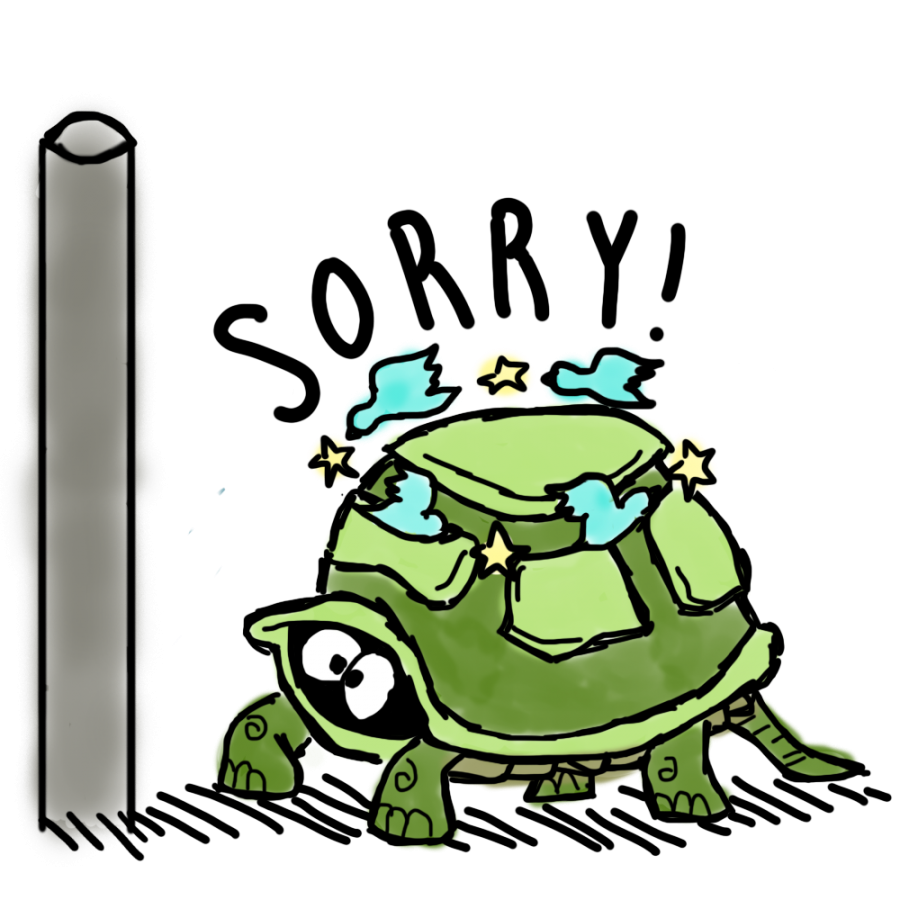Coming out of my shell: Awkward Advice
Accepting and embracing my inherent clumsiness
February 6, 2019
“Your time starts now.”
I stood in front of a room full of eighth graders, and I was supposed to come up with an impromptu presentation about calligraphy in preparation for the AP Chinese exam I’d be taking the following year.
The room was dead silent. I willed myself to speak, but words didn’t form. I could feel the eyes of my peers and teacher as my heart thundered. I hadn’t reviewed the textbook the night before, and it was quite obvious: I was a deer in headlights.
A very awkward 30 seconds passed, and the teacher told me to sit down. My eyes watered as I walked back to my desk, defeated and silently criticizing myself. Why didn’t I just say something? Why couldn’t I just make something up that sounded convincing?
Honestly, I doubt that anyone in that class remembers it happened at all, but whenever my brain spontaneously dives into cringe-mode and replays all the embarrassing events that have ever occurred in my life, that day is crystal-clear in my memories.
It’s not surprising. If you’ve ever had an encounter with me before, you’d probably know that I’m a really socially-awkward person. I have no idea how to greet people. Do I shake hands? Smile and wave? Give them a hug? Randomly burst into dance? How did I never learn these unspoken rules?

I’ve never understood how people know exactly what to say to dissolve the awkward tension in a room. We all know at least one person who can initiate a conversation with anyone and have it run completely smoothly and naturally. While they’re making friends and chatting up a storm, I’m over here walking into poles and apologizing to them. And as much as I’d like to say that I just wrote that to add in a bit of humor, it’s actually happened a few times.
It’s frustrating when people tell me I’m only funny when I make silly mistakes and do “stupid stuff.” That my failed attempts at purposeful humor end up becoming awkward. It’s frustrating when I meet someone new at the same time as one of my less-awkward friends and they only remember my friend.
I’m always “so-and-so’s friend” or “so-and-so’s classmate.” Why can’t I just be Emily?
Now that I think about it, I’m the only one to blame for my exasperation. I’ve tried and been unsuccessful at starting up the conversation so often that sometimes, it’s just easier not to say anything. But when I don’t speak up, there’s no way that people will remember me. I can’t expect people to magically know my name if I don’t tell them.
Even though I dislike my awkwardness, I have a lot of qualities that I am proud of: friendliness, generosity, selflessness. I shouldn’t let one negative aspect of my life affect how others perceive the more positive characteristics I have. It’s sad to think about all the missed opportunities — the friendships I could have made but didn’t because I was impeded by one obstacle.
When I tell my friends about this insecurity, they agree that I’m occasionally awkward, but when they say it out loud, it doesn’t sound like a fault. In fact, they tell me that my clumsiness is one of the qualities they find the most endearing about me, which immediately makes my situation more positive.
So I guess I can embrace my awkwardness sometimes. Even though it’s annoying in certain situations, it makes my life and the lives of those who matter to me more entertaining, not to mention the fact that it’s one of my defining characteristics.
And besides, I know I’m not the only awkward one out there. I’m sure many of you readers understand when I say that clumsiness is almost impossible to hide. One way or another, it ends up manifesting at the worst times possible.
Maybe we shouldn’t be afraid of it. Maybe it’s okay to spice up your life with a cringe-filled moment once in a while. I know I do it all the time.
Don’t worry too much — we’ll just be awkward turtles together.

















